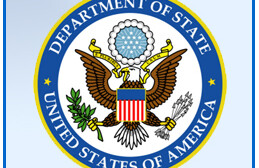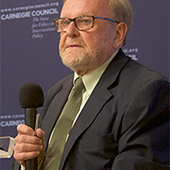First we decide, then we tell the rest of the world
State Department official in first George W. Bush administration
Listen before we decide
Second GWB administration policy declaration
Whatever the outcome of the 2008 election, our next President will have in the forefront of his/her policy agenda the matter of how the United States does business with the world. On the one hand, there is a negative impetus for this—the need to improve consistently rock-bottom approval rates for America across the globe, even among the ranks of our Western European allies. There is also, however, a positive driving force—a reaffirmation of the virtues of diplomatic engagement, compliance with international treaties, and the benefits of a collective security approach in an unruly world.
There are at least three important elements of global engagement:
- On a host of critical issues, cooperative engagement is not only the decent thing to do, but it serves our national interest. To be very selective, these issues include: cooperation on combating global terrorism; ensuring energy security and supply; comparative assessment of, and joint approaches to, growing and increasingly diversified Muslim communities in the West; defining a more equitable globalization ; and returning to a robust cooperative effort on prevention of proliferation of nuclear weapons and technology.
- On nuclear weapons, during a Presidential debate in 2004, both Messrs. Bush and Kerry identified nuclear nonproliferation as the most urgent policy challenge. Four years on, the most significant contribution to the issue is the Hoover Institution's series on the Reagan-Gorbachev 1986 Reykjavik summit. The findings were summarized in the op-ed pieces in the Wall Street Journal in January 2007 and 2008, signed by George Schultz, William Perry, Henry Kissinger, and Sam Nunn, and urging an agenda for "getting to zero" on nuclear weapons. The Hoover group's focus is largely on technical aspects, such as the de-alerting of missile warheads from hair-trigger minute calculations to hours or even days. This technical part of the equation is crucially important, but of equal importance is the political and diplomatic cooperation, a "coalition of the willing" as it were, to reach a global consensus on an eventual nuclear stand-down, with mileposts along the way of safety and security of weapons stockpiles, mutual transparency among stakeholders as to command and control, and a strict adherence to nonproliferation of nuclear hardware and technology to states and nonstate actors alike. In other words, there remains work to be done in framing cooperation on a policy agenda.
- U.S.-led cooperation on these grave matters illustrates how international cooperative security may serve national interests. This must go beyond single-issue preoccupation. Part of our problem in dealing with Pakistan, for example, is that the signal goes out to Islamabad that "we basically see you as a basket case, but are forced to do business with you in the war on terrorism." Quite apart from the necessity of moving beyond the "war on terrorism" mentality, how much more therapeutic it would surely be if we seek to include Pakistan, a nuclear nation, as part of the solution, a key member of a coalition of the willing that signs on to internationally accountable principles and standards for stewardship of its nuclear inventory.
In sum:
[1] There is a rich vein of policy-oriented thinking to be mined on the subject of U.S. global engagement and leadership;
[2] The issue is an ethical as well as a practical one, given the prevailing sense of moral vacuum in our wielding of the instruments of international policy over the past seven years; and
[3] The time is now in terms of informing the debate in the run-up to the 2008 elections.
Philip Stephens echoed much of this in an op-ed piece in the Financial Times ["America is still indispensable but it must work with others", November 2, 2007]. It is self-evidently out of date, but makes two important points. First, he writes:
"If American power is still indispensable, it is no longer sufficient. America's choices condition, often decisively, the decisions of others. But their assent cannot be taken for granted."
Then, looking to the future, he adds:
"There is plenty in the promises of the main Democratic candidates to mark out a different course….Hillary Clinton, Barack Obama and John Edwards dwell at length on the need to build America's reputation in the world. For Mrs. Clinton the priority is to 'restore our leadership'; for Mr. Obama to renew' it. Mr. Edwards puts the emphasis on the prestige that follows from moral leadership." …
But what is missing is any sort of operational plan for restoring U.S. moral leadership; what does global engagement mean, and how are we to go about it?
A new articulation of American leadership, in the interests of our own security and that of the world, is the defining challenge of a new foreign policy based on cooperation and engagement. For the central lesson of the unruly two post-Cold war decades has surely been that, with a raft of new or exacerbated security challenges—from terrorism to WMD proliferation to energy security to intervention in civil conflicts—cooperation is not just morally appealing, but strategically smart. To quote one veteran observer, it is both possible and desirable "to define multilateral engagement in terms of American national interests.
Senior Fellow David Speedie is working on a new Carnegie Council initiative on global engagement.


